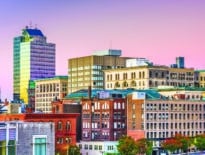The city of Boston used money it received from assessments on the roughly 35 million ride-for-hire trips that originated in the city in 2017 to rebuild miles of sidewalk, restore lane markings, redesign key intersections and add bike share stations.
Massachusetts collects 20 cents for each ride with a transportation network company (TNC) like Uber or Lyft, with half of the total collected going to cities and towns based on the number of rides that originated within their borders. For Boston, its 34.9 million TNC rides in 2017 translated into $3.5 million in revenue.
The Boston Municipal Research Bureau said that money was spent on a variety of transportation-related projects, like $1 million for the rebuild of three miles of sidewalks in low-income areas with high pedestrian traffic and more than another $1 million to restore lane markings, crosswalks and bike lanes, and to work towards the redesign of key intersections.
The city spent another $500,000 to add 18 to 20 new public bike share stations, about $280,000 to fund a new construction management team to work on projects in the city’s Go Boston 2030 plan, and a little more than $98,000 to pay for a senior traffic engineer to focus on signal timing and road safety, the research bureau said.
Boston can expect its next allotment of TNC-derived revenue to be greater than $3.5 million – between 2017 and 2018, the number of TNC rides originating in the city grew by 21 percent to more than 42.2 million, the bureau said.







